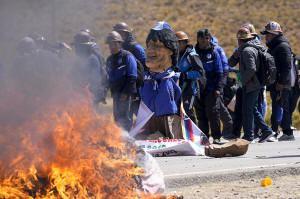March for Bolivia's ex-President Morales turns violent, as political
crisis escalates
 Send a link to a friend
Send a link to a friend
 [September 18, 2024]
By PAOLA FLORES [September 18, 2024]
By PAOLA FLORES
CARACOLLO, Bolivia (AP) — Thousands of anti-government demonstrators
marching in support of Bolivia’s former President Evo Morales clashed on
Tuesday with counterprotesters blocking their way, a stark sign of an
escalating power struggle in the volatile Andean nation.
In his most brazen show of force yet against current President Luis Arce,
Morales sent word to his followers to mobilize what he called a “March
to Save Bolivia,” a 190-kilometer (118 mile)-trek from the small village
of Caracollo to the capital, La Paz, denouncing the government of his
protege-turned-bitter rival.
Morales, a former coca grower, has retained significant support among
poor and Indigenous Bolivians despite his resignation in 2019 amid mass
protests over his disrupted re-election.
The march in solidarity with him began peacefully Tuesday morning, but
turned violent hours later when hundreds of counterprotesters, armed
with tear gas bombs, stones and firecrackers, spread across the highway
waiting to confront the nearly 10,000 marchers. Some of them set a giant
effigy of Morales on fire.
The Morales supporters, raising multi-colored Indigenous flags and
chanting against Bolivia's economic crisis, surged toward them, using
slingshots to pelt their adversaries with rocks as police in pickup
trucks and on motorbikes looked on. Morales' followers soon forced the
counterprotesters to retreat, their shouts — “Evo, Bolivia wants you
back!” — drowning out the pro-Arce activists who chanted, “Evo, you
traitor, your time has passed.”

A top official in Arce's government, Eduardo Del Castillo, told
reporters that 13 people were injured in the scuffles, including three
police officers. Associated Press reporters saw some pro-Morales
marchers chasing the counterdemonstrators into the rolling Andean
highlands on either side of the highway, beating them with sticks,
pushing them to the ground and kicking them.
Arce and his ministers accused Morales of trying to orchestrate a coup.
Using exaggerated, apocalyptic rhetoric, Del Castillo denounced Morales’
protest as a “death march” and said that the former president seeks “to
destroy democracy in Bolivia and end the lives of Bolivians.” He denied
that police used force against peaceful protesters, insisting that
officers were attacked first.
Morales, for his part, claimed that the government sent plainclothes
police officers to stir up trouble and vandalize protesters' vehicles,
saying that Arce's government “has lost respect for human rights and
laws in the country.”
The mood was largely defiant late Tuesday at a protest encampment in
Panduro, in the mining state of Oruro, where the road weary marchers
spent the night.
[to top of second column]
|

An effigy of former President Evo Morales burns on a road in Vila
Vila, Bolivia, to block Morales supporters who are marching to the
capital to protest the government of current President Luis Arce in
an escalation of a political dispute between the two politicians,
Tuesday, Sept. 17, 2024. (AP Photo/Juan Karita)

“The government is the one that sent police officers to try to stop us,
but we were united and defeated them,” said Yamile Cruz, leader of
Frutcas, a group of Indigenous farmers on the edge of the world’s
largest salt flat. “This march will not retreat despite the government's
intentions.”
Tuesday's mayhem deepened the rift at the top of Bolivia’s governing
party, threatening to take the political feud between Morales and Arce
into a dramatic new phase. Morales, Bolivia's first Indigenous President
who oversaw the country's commodities boom from 2006 to 2019, seeks to
run against Arce, his former economy minister, in next year's
presidential election.
Protesters at the march Tuesday demanded that Morales be allowed on the
2025 electoral ballot despite a ruling by Bolivia’s constitutional court
last year that Arce insists disqualifies him. Morales has dismissed the
court resolution as politically motivated.
“They not only want to disqualify me, they want to restrict political
rights,” Morales told reporters at the march. “Above all, we want the
president and his government to heed our demands.”
Cracks in the governing Movement Toward Socialism, or MAS, first opened
in 2019, when Morales ran for an unconstitutional third term. He won a
contested vote plagued by allegations of fraud, setting off mass
protests that caused 36 deaths and prompted Morales to resign and flee
the country. He returned and launched his political comeback after Arce,
his choice candidate at the time, won the 2020 election.
The political rivalry has divided Congress and exacerbated an economic
crisis stemming from the depletion of Bolivia’s foreign-exchange
reserves. Protesters on Tuesday decried Arce's failure to halt the
spiral and recalled Morales' tenure as one of economic growth and social
uplift.
“We are suffering from hunger," said Felix Torres, a peasant protester
from the highlands. “This is not how you govern.”
___
Associated Press writer Isabel DeBre in Buenos Aires, Argentina,
contributed to this report.
All contents © copyright 2024 Associated Press. All rights reserved
 |